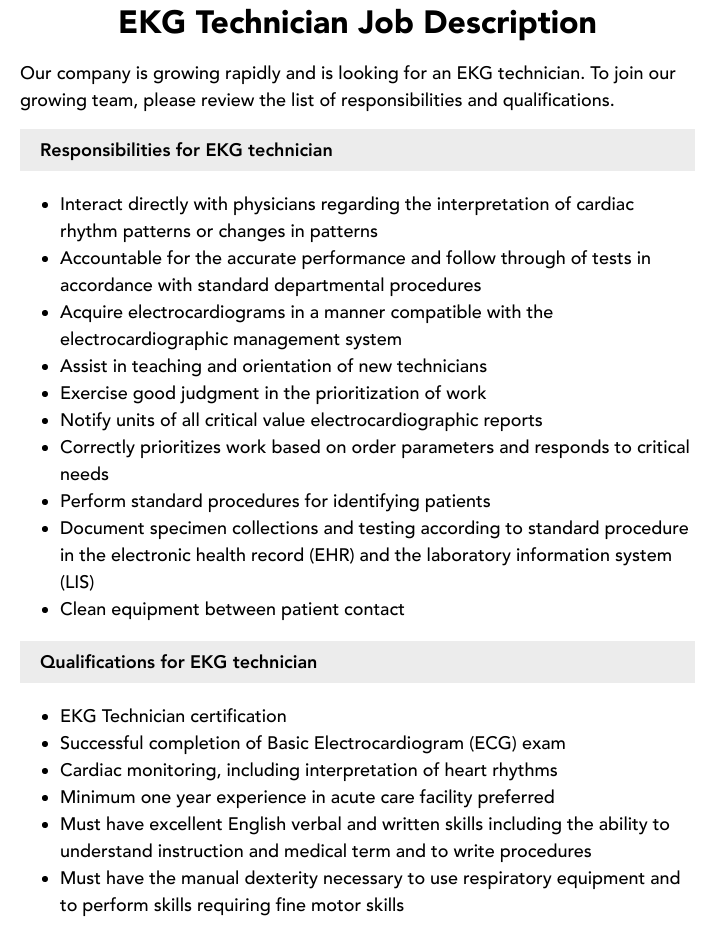
An EKG technician job description outlines the duties and responsibilities of a professional who operates electrocardiogram (EKG) equipment to record the electrical activity of a patient’s heart. They prepare patients for the procedure, ensure their comfort, and provide clear instructions. EKG technicians must have a strong understanding of anatomy, physiology, and medical terminology. They must also be able to operate and maintain EKG equipment, and interpret and analyze EKG tracings.
EKG technicians play a vital role in the diagnosis and treatment of heart conditions. Their work helps physicians identify arrhythmias, heart attacks, and other cardiac abnormalities. EKG technicians must be compassionate and have excellent communication skills, as they often interact with patients who are anxious or in pain.
The main article topics will explore the following:
- The duties and responsibilities of an EKG technician
- The importance of EKG technicians in the healthcare system
- The benefits of working as an EKG technician
- The qualifications and training required to become an EKG technician
1. Patient care
In the context of an EKG technician job description, patient care is of paramount importance. EKG technicians must be able to interact with patients in a compassionate and understanding manner, as many patients may be anxious or in pain. Excellent communication skills are also essential, as EKG technicians need to be able to explain the procedure to patients and answer any questions they may have.
- Empathy and understanding: EKG technicians must be able to empathize with patients and understand their concerns. They need to be able to put themselves in the patient’s shoes and understand what they are going through.
- Clear and concise communication: EKG technicians need to be able to communicate clearly and concisely with patients. They need to be able to explain the procedure in a way that the patient can understand, and they need to be able to answer any questions the patient may have.
- Reassurance and support: EKG technicians need to be able to reassure and support patients. They need to be able to calm patients down and make them feel comfortable.
- Cultural sensitivity: EKG technicians need to be culturally sensitive and understand the different needs of patients from different backgrounds.
By demonstrating these qualities, EKG technicians can help to make the EKG procedure less stressful for patients and ensure that they receive the best possible care.
2. Technical skills
In the context of an EKG technician job description, technical skills are essential. EKG technicians must be able to operate and maintain EKG equipment, and interpret and analyze EKG tracings. This requires a strong understanding of the following:
- Anatomy and physiology: EKG technicians must have a strong understanding of the anatomy and physiology of the heart in order to be able to interpret EKG tracings.
- Electrocardiography: EKG technicians must have a strong understanding of electrocardiography, the technique used to record EKG tracings.
- Medical terminology: EKG technicians must be familiar with medical terminology in order to be able to communicate with other healthcare professionals.
In addition to these technical skills, EKG technicians must also have good problem-solving skills and be able to work independently. They must also be able to work as part of a team and be able to follow instructions.
By possessing these technical skills, EKG technicians are able to provide valuable information to physicians, which can be used to diagnose and treat heart conditions.
3. Medical knowledge
Medical knowledge is essential for EKG technicians, as it enables them to perform their duties effectively and accurately. A strong understanding of anatomy and physiology allows EKG technicians to understand the heart’s structure and function, which is necessary for interpreting EKG tracings. Medical terminology is also essential, as it allows EKG technicians to communicate effectively with other healthcare professionals. Without a strong foundation in medical knowledge, EKG technicians would not be able to perform their jobs effectively.
Here are some specific examples of how medical knowledge is used in the context of an EKG technician job description:
- EKG technicians use their knowledge of anatomy and physiology to identify the different parts of the heart and their functions.
- EKG technicians use their knowledge of medical terminology to communicate with other healthcare professionals about the results of EKG tracings.
In conclusion, medical knowledge is essential for EKG technicians, as it enables them to perform their duties effectively and accurately.
4. Accuracy
In the context of an EKG technician job description, accuracy is of paramount importance. EKG technicians must be able to accurately record and interpret EKG tracings, as their findings can be used to diagnose and treat heart conditions. Inaccurate EKG tracings can lead to misdiagnosis and improper treatment, which can have serious consequences for the patient.
- Attention to detail: EKG technicians must be able to pay close attention to detail when recording and interpreting EKG tracings. They need to be able to identify even the smallest abnormalities, as these could be indicative of a heart condition.
- Knowledge of anatomy and physiology: EKG technicians need to have a strong understanding of the anatomy and physiology of the heart in order to be able to accurately interpret EKG tracings. They need to be able to identify the different parts of the heart and their functions, and they need to be able to understand how the heart’s electrical system works.
- Experience: EKG technicians gain experience over time, which helps them to become more accurate in their work. They learn to recognize the different patterns that can be seen on EKG tracings, and they learn how to interpret these patterns correctly.
- Quality control: EKG technicians should have a system in place to ensure the quality of their work. This may involve having their work reviewed by a supervisor or by another EKG technician.
By adhering to these principles, EKG technicians can help to ensure that patients receive the correct diagnosis and treatment for their heart condition.
5. Teamwork
Teamwork is an essential component of an EKG technician job description. EKG technicians often work as part of a team of healthcare professionals, including physicians, nurses, and other technicians. They must be able to collaborate effectively with other members of the team in order to provide the best possible care to patients.
There are many ways that EKG technicians collaborate with other healthcare professionals. For example, they may work with physicians to interpret EKG tracings and make a diagnosis. They may also work with nurses to monitor patients’ vital signs and provide care. In addition, EKG technicians may work with other technicians to maintain and calibrate EKG equipment.
Effective teamwork is essential for the smooth operation of any healthcare setting. By working together, healthcare professionals can provide the best possible care to patients. EKG technicians play a vital role in the healthcare team, and their ability to collaborate effectively with others is essential to their success.
FAQs about EKG Technician Job Description
This section provides answers to frequently asked questions about EKG technician job descriptions.
Question 1: What are the key responsibilities of an EKG technician?
EKG technicians are responsible for operating and maintaining EKG equipment, preparing patients for EKG procedures, and interpreting and analyzing EKG tracings. They must also have a strong understanding of anatomy, physiology, and medical terminology.
Question 2: What are the educational requirements for becoming an EKG technician?
EKG technicians typically need a high school diploma or equivalent and must complete a formal training program in electrocardiography. Some employers may also require EKG technicians to be certified by a nationally recognized organization.
Question 3: What are the job prospects for EKG technicians?
The job outlook for EKG technicians is expected to be good over the next few years. This is due to the increasing demand for healthcare services and the aging population.
Question 4: What are the salary expectations for EKG technicians?
The salary expectations for EKG technicians vary depending on their experience, location, and employer. According to the U.S. Bureau of Labor Statistics, the median annual salary for EKG technicians was $56,280 in May 2021.
Question 5: What are the career advancement opportunities for EKG technicians?
EKG technicians can advance their careers by becoming certified in other areas, such as echocardiography or stress testing. They can also move into management positions or become educators.
Question 6: What are the challenges of working as an EKG technician?
EKG technicians may face challenges such as working with patients who are anxious or in pain, dealing with difficult family members, and working long hours.
These are just a few of the frequently asked questions about EKG technician job descriptions. For more information, please consult with a career counselor or visit the website of the National Association of EKG Technicians.
Summary: EKG technicians play a vital role in the healthcare system. They are responsible for providing accurate and reliable EKG tracings, which can be used to diagnose and treat heart conditions. The job outlook for EKG technicians is expected to be good over the next few years, and the salary expectations are competitive. EKG technicians can advance their careers by becoming certified in other areas or moving into management positions.
Transition to the next article section: EKG technicians are an essential part of the healthcare team. Their work helps to ensure that patients receive the best possible care.
Tips for Writing an EKG Technician Job Description
An EKG technician job description outlines the duties, responsibilities, and qualifications required for the position. It is important to write a clear and concise job description that accurately reflects the role of the EKG technician in your organization.
Here are five tips for writing an EKG technician job description:
- Start with a strong introduction. The introduction should provide a brief overview of the position and its purpose within the organization.
- List the essential duties and responsibilities. The duties and responsibilities should be listed in detail, and should include all of the tasks that the EKG technician will be expected to perform.
- Include the necessary qualifications. The qualifications should include the minimum education and experience requirements for the position. You may also include preferred qualifications, such as certifications or licenses.
- Proofread carefully. Once you have finished writing the job description, proofread it carefully for any errors in grammar or spelling.
- Get feedback from others. Ask a colleague or supervisor to review the job description and provide feedback. This will help you to ensure that the job description is clear and accurate.
By following these tips, you can write an EKG technician job description that will help you to attract and hire the best candidates.
Summary: An EKG technician job description is an important tool for attracting and hiring qualified candidates. By following these tips, you can write a job description that accurately reflects the role of the EKG technician in your organization.
Transition to the article’s conclusion: A well-written job description is essential for finding the best possible candidates for your open positions.


